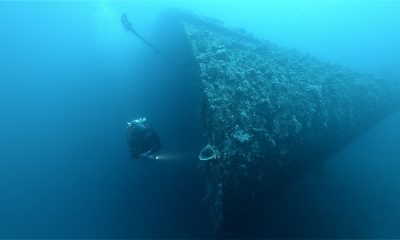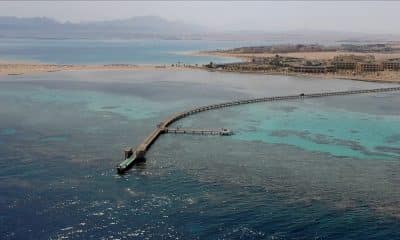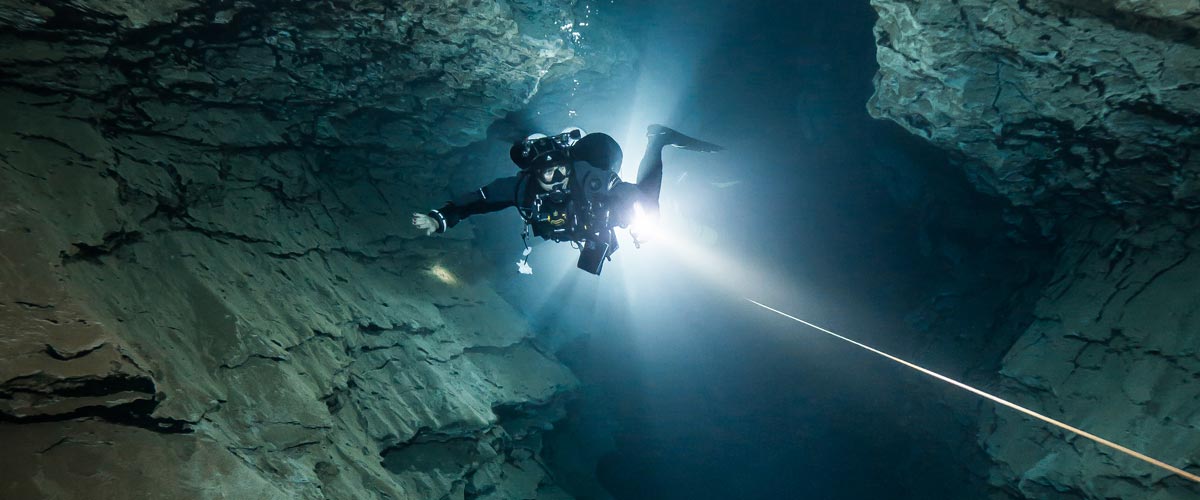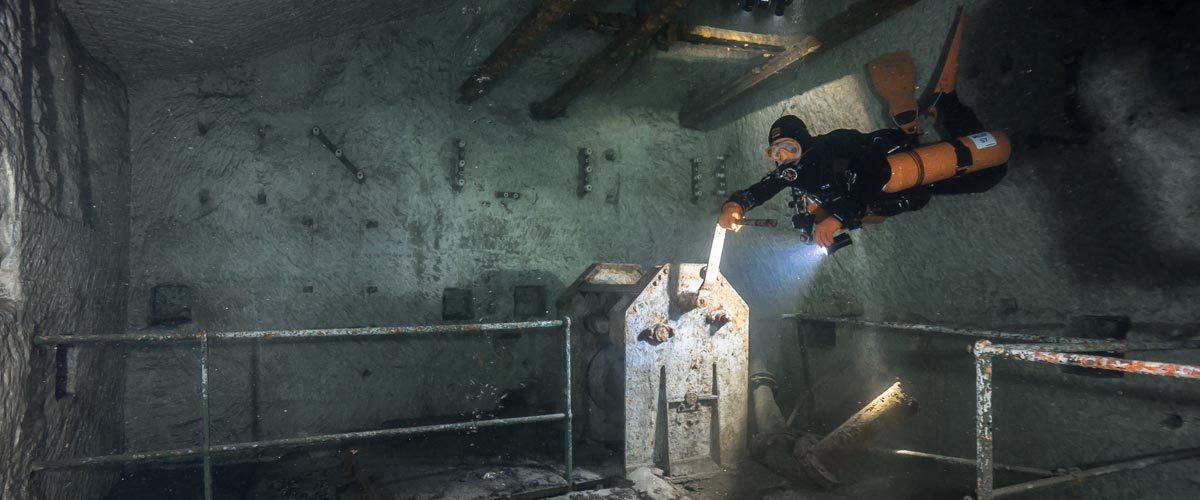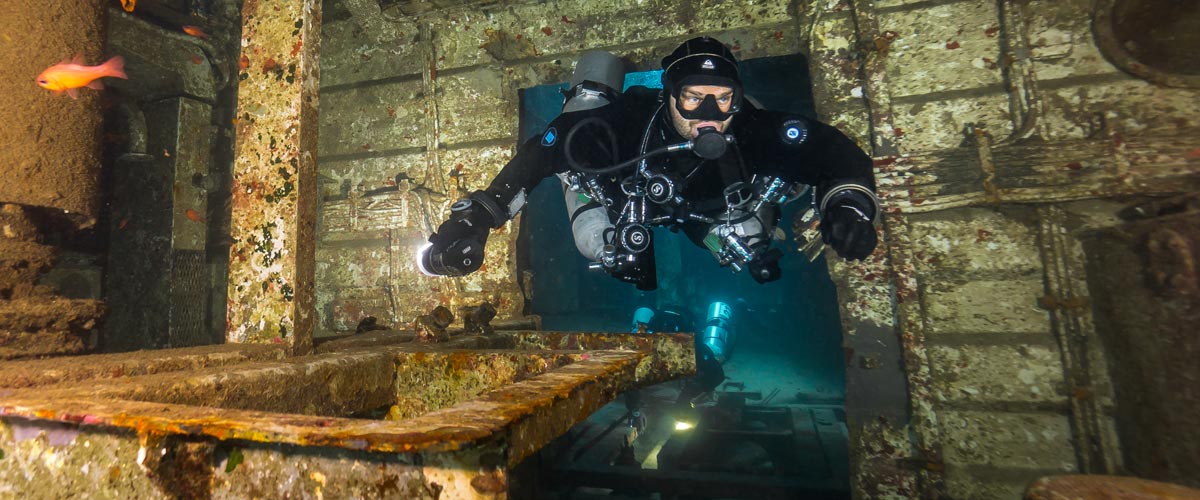Dive Training Blogs
What’s the Right Age to Certify My Kids?
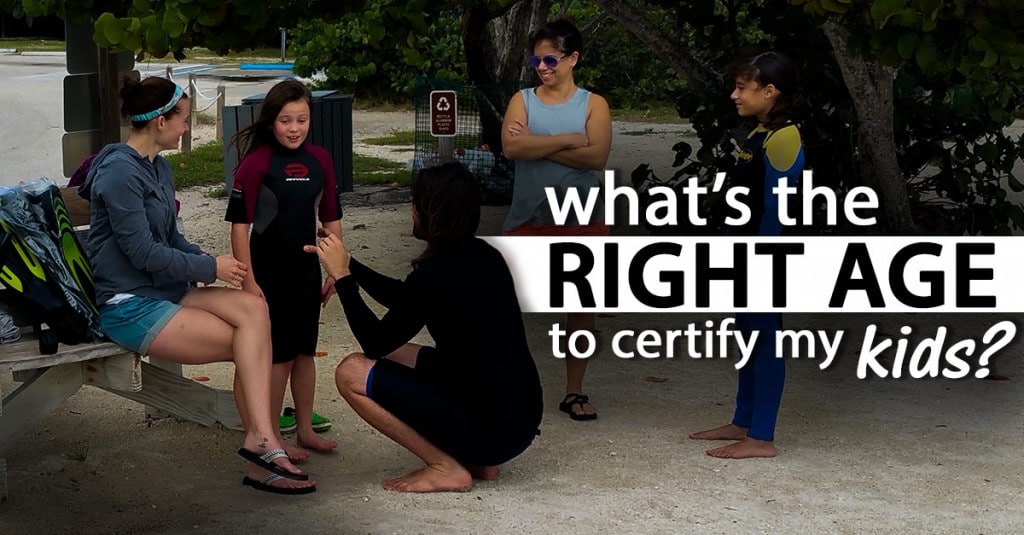
By: Stephanie Miele & Sean Harrison
“What is the best age to certify my kid?” This is a question we hear quite often SDI, and as you can imagine, it’s a pretty loaded question. So, to help shed some light on this topic, we wanted to get two perspectives to weigh in, so we asked a mother to give us her opinion about certifying her kid and then we asked a father for his opinion. Below is their response.
FROM A MOM’S PERSPECTIVE

I’m a parent, therefore, I worry. I’m constantly trying to toe the line of being protective of my son, but still allowing him to have experiences that will shape his life for years to come (not an easy balance as many of you know). I must admit that when I had him, I thought that the first few years were the toughest with just trying to survive the sleepless nights, and the life style that comes with having a very active toddler. I was in for quite the shock as he got older and more adventurous that the balance of worry vs. experience intensified.
As he got out of the toddler years, started listening and maturing our lives began to change. I found myself not planning my day around naps or having to lug around a diaper bag full of stuff and we began to go on “adventures”. I loved seeing the world through his eyes and we started to explore different things together albeit carefully. He has been hiking at the Grand Canyon, kayaking with seals in Washington state, windsurfing in Bonaire, and snorkeling in Florida, but when the idea of scuba diving was broached I had to admit that I was the one that was hesitant.
My son just turned 8 and he was able to partake in the SDI Future Buddies program. For his birthday, he specifically asked for a snorkeling party at a local dive site and the opportunity to learn how to scuba dive. There was a request for a barracuda themed birthday cake, but that is a story for another time. I knew he wanted to dive and the time was coming, but I could not believe he was actually old enough to do it. I did have to ask myself if he was ready and make that judgment call on his behalf.
To see if he was ready I asked myself the following questions as I do with any new activity:
1. Is he mature enough to partake in the activity?
I have witnessed my child in many situations and for him to be able to scuba dive I had to make sure that he had the attention span and the physical ability to do it. Jack has been swimming for many years and, at this point, he is a stronger swimmer than I am. He naturally took to freediving to the bottom of the pool and last year, when we were on vacation, he was freediving to about 15 feet to the ocean bottom. He is naturally at ease in the water so the physical comfort was easy for me to feel ok about.
Now, the attention span was a different story. Since the apple doesn’t fall far from the tree, in this case, his attention span was something that I was hesitant about. We started watching videos before he even got in the pool and we bought a fish identification chart so that we could identify what we were seeing in the videos. His attention span for these videos and identification chart was amazing and it made me feel better about him getting in the pool. This had a very positive effect on his attention span, allowing him to hold an interest in the activity and demonstrate to me that he was capable of retaining important information about it. This made me feel much more at ease about him moving on to the practical pool sessions where the most crucial concepts are introduced.
2. Do I get a good feeling from the instructor taking him in the water?

Well, my husband was the instructor and he has his son’s best interests in mind. There was a lot of pressure on him to make sure that the experience was positive. That and if he messed it up, he would have to answer to me. Nonetheless, my husband is an excellent instructor and has so much experience with teaching kids scuba programs that my mind was at ease that my son was in good hands.
Had I not known the instructor that was taking him diving, I would have taken a course with him/her to see if I liked their method of teaching and if they would be a right fit for my son. Also, I would have asked to talk to his/her past students for feedback about their experiences. Additionally, I would take my son with me and visit the facility where the training was taking place to see if he felt comfortable. Choosing the instructor would have been an interview process and my son would have met the instructor so that I could see their interaction above the water first hand.
3. Is his interest genuine?
For me, I needed to know whether this is something he wanted to do or if he was doing it because of what mommy and daddy do for a living. We offered him all sorts of other options for his birthday gift and he kept coming back to scuba. He was so excited to try scuba because of his genuine interest and not doing it because he thought it would please me. My mind was made up after I realized that he was mature enough, his attention span could be held and I felt very comfortable with the instructor. It was worth a try.
Each child is different and as parents, we need to the research to make sure that we are making the best decisions for them. I think there are some children that are naturally adventurous so having little mental checklists when deciding what may or may not be a fit for them can be helpful.
In the end, he was ready and honestly quite a natural at the sport. I was beyond impressed with his skills in the water and …… Seeing him experience breathing underwater for the first few times was a memory that I will never forget. Plus, now I can actually get back in the water without feeling guilty about leaving him behind. As a parent, I am constantly second guessing myself with all of the choices that I have to make for him, but the one thing that I am certain of beyond doubt is what he is ready for. In my heart, I knew he was ready but it was good to put the time in and really think if it was right for him.
FROM A DAD’S PERSPECTIVE

Sitting in a marketing meeting, don’t you just love meetings! and the topic of articles comes up. Normally I turn off at this point. I have written plenty of articles in the past but I can’t hit deadlines and if I don’t do a massive brain dump while I am formulating the thoughts for what I just committed to, it probably won’t happen. So here I am, 30 minutes outside the meeting and doing a brain dump.
My wife always said, if our sons did not like water, they were going to have a rough life
My perspective on when someone should be certified will certainly be different from others, being on and in the water has been my life. My wife, also a water person, always said, if our sons did not like the water, they were going to have a rough life. So here’s what we did to one, make sure they were safe around the water and two, make sure they had an appreciation for the water. Both of those create comfort.
We started our sons in the water shortly after birth, nothing major or crazy, but they were in pools, lakes, and the ocean whenever the opportunity presented itself, which was often. Both started swim lessons pretty early, for those parents that have done these “swim lessons” you know they are really more about getting the parent comfortable with their child in the water and retraining the child not to breath underwater. Eventually, our little guppies moved up to the point where they passed the basic swim test so they could swim in the deep end of the pool. The lessons were heavily supplemented by their mom swimming and teaching them even more. Okay…I will admit, mom did the majority work. Summers were and still are filled with swimming pool and ocean swim time, snorkeling, and yes, the occasional ear infection.
Self-rescue

The final test to ease up on some of the supervision (even though we are always within sight) while they were in or around the water, was the self-rescue fully clothed. Here is how we did it, although I am certain there are other (maybe even better) ways of doing this test. The boys were full dressed: long sleeve shirt, long pants, shoes, and socks, they jumped in the pool and had to swim to the other end and back, float for five or so minutes, then get out of the water without a ladder. Needless to say, both our boys passed with flying colors. Our youngest, he was three at the time, continued to swim fully dressed for the next 45 minutes. He thought it was fun.
It’s not just as simple as saying “my child wants to scuba dive, so I thought I would sign them up for dive lessons”
I write all of the above because I believe it’s not just as simple as saying “my child wants to scuba dive, so I thought I would sign them up for dive lessons”, they first need to have that comfort and respect for the water. The path we choose is of course not the only one: sailing, water skiing, surfing, boogie boarding, white water rafting, and the list goes on, all lead to a comfort and respect for the water. The final component and this one needs to be assessed by the parent (be honest) and the potential scuba instructor, is maturity.
SDI minimum age for scuba certification is 10 years old, but that does not mean all 10-year-olds are ready, it also doesn’t mean all 18-year-olds are ready
Scuba diving requires constant assessment and situational awareness. There are gauges to watch, buddies to keep track of, an exit point to find, and water conditions to deal with. Parents with kids that are interested in scuba diving should visit their local SDI dive center and speak with an SDI instructor, try to find an SDI instructor that enjoys teaching children. Make an appointment ahead of time so you, your child, and the instructor can really spend some time together. The SDI instructor can let your child try on gear, hold the equipment they will be using, and answer those questions rattling around in their head like: “Did they ever find Dory?” and “can I dive to the deepest part of the ocean?”.
I am happy to report that our oldest son is progressing well in his scuba class, rock solid in the water if we can just get him to do the homework! Good luck getting your children certified, it is a blast to share the sport with them and see the look of amazement in their eyes. It’s also very cool hearing them say to their classmates “I scuba dive” they quickly become the coolest kid in school.
To find out more about International Training, visit www.tdisdi.com.

Blogs
Intro to Tech: What is it about?
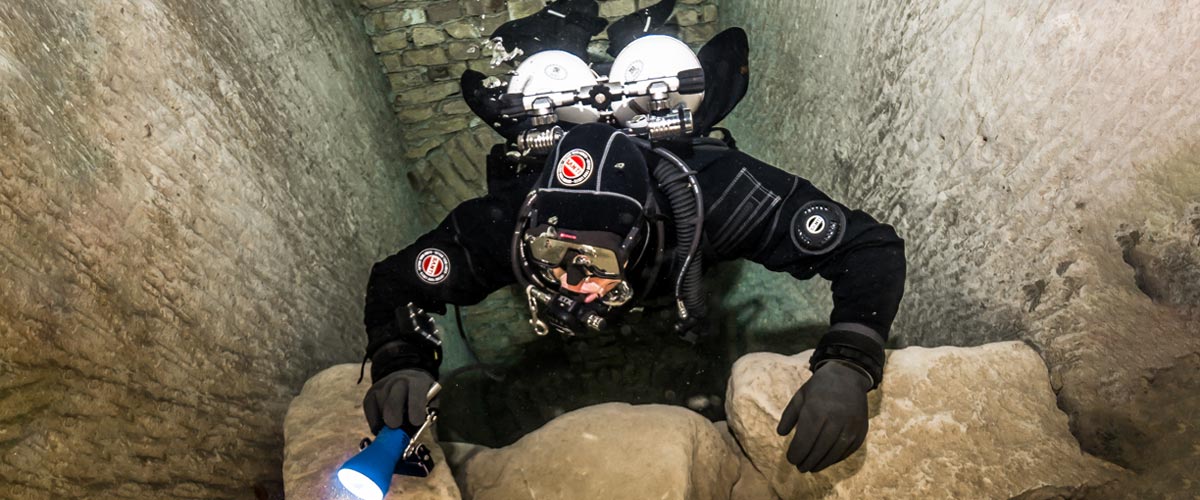
Article by José Pablo Mir
Pictures by Cezary Abramowski
The world of technical diving is exciting. It opens the door to new sites, depths, and bottom times. More importantly, it opens our minds to a new way of planning, facing, and experiencing dives, even those not purely technical.
Becoming a technical diver is a process, and like in other aspects of life, we should find the proper entry point that suits us best based on our knowledge and experience. The Introduction to Technical Diving course from TDI -the world’s largest and most recognized technical diving teaching organization- is the best option for divers who have yet to gain experience in the fundamental aspects of this new practice. The course’s content and its embrace of new techniques and technologies make it possible to acquire a solid foundation to learn and gain experience in this practice properly.
Becoming a technical diver is not something that happens overnight, whether deciding to become one or receiving a certification card stating we are now technical divers. It is a slow process extending farther away than any introductory course. It requires effort and dedication. But it will bring us satisfaction from day one -or two.
It is a matter of mentality
First, we must understand and accept that technical diving, involving greater depths, longer bottom times, exotic gases, virtual or real ceilings, and more, comes with higher levels of risk than the sport diving we have been practicing until now.
Although this discussion usually starts with a warning about risks, as I’ve done in the previous sentence, our practice is not a game of chance.
Technical diving is a rational activity that requires maturity and good judgment, and we will put everything into ensuring that each dive is a successful one -meaning we return from it safe and sound. With this understanding, we will strive to establish a mental attitude more aligned with our practice and its realities.
This new “technical diver” mindset we will develop will lead us to be more cautious in our executions, more analytical in our plans, more rational in our strategies, and more detailed in our procedures.
Experience will keep teaching us to know ourselves better, to keep our anxiety and other emotions under control, and to manage our impulses. Over time, our senses will sharpen, and we will be more attentive to the particulars of the situation we find ourselves in.
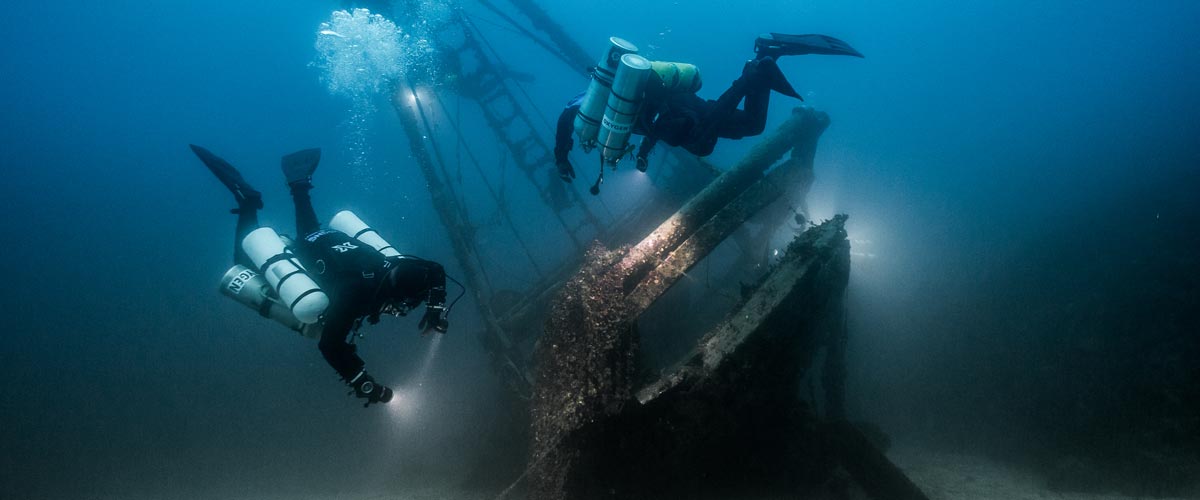
Strategies and procedures
Our strategies, those broad guiding lines tracing the path to follow, from how to approach planning to where, with what, and how we are willing to get there, will be more specific and more practical. Not because they magically become so, but because we will consciously and deliberately frame them that way.
We will establish clear, concise, and realistic procedures. Not only for the undesirable situations that may present themselves but also for those that are part of our dive objectives.
Even though, as technical divers, we often use equipment different from what we were previously accustomed to, it is essential to note that the gear does not make the diver. In a way, we could consider such equipment as the necessary tools to implement what our goal seeks to achieve, according to our strategies and procedures.
Technique plays an important role
We must put our greatest effort into learning and perfecting the different techniques we will be acquiring. Buoyancy, trim, propulsion, cylinder handling, deploying DSMBs and lift bags, valve drills, and more are essential skills we must begin to master to progress in our art. What we cannot do, when we need to do it, can harm us.
Our techniques must be effective and achieve the purpose for which they were devised. But they must also be efficient and require the least resources possible, including the time they take and the effort they demand. Effectiveness and efficiency will prevail over beauty and other considerations that may come to mind, although none of them should be mutually exclusive. A technique executed efficiently and effectively tends to have an inherent beauty.
Refining techniques is a lifelong mission. Some of them will be easy to master from the go; others, on the other hand, will be our life mission and will require many repetitions just to resemble the idea we have in mind of how they should be executed.
We must consider the environment
Our learning, the needs and musts of the practice we engage in, the experience we gradually gain, our strategies and procedures, and even our equipment and tools change with the environment.
Diving in the ocean, everything about us must be suitable for ocean dives. Conditions there rarely emulate those found in a pool, lake, or river. Variable winds and currents, greater depths, visibility conditions, other divers with uncertain skills around us, marine life, maritime traffic, distance from the coast, and many other factors add complexity and uncertainty.
It is never necessary to master the pool on the first day, but planning and aspiring to gradually cope with the ocean’s conditions is essential.
The cost of good training
We are aware that our resources are often scarce in relation to the possibilities of use we could give them if they were not. To a greater or lesser extent, we are part of the economic reality in which we are embedded.
Fortunately, the cost of good technical diver training is not an entry barrier. Comparing training and equipment costs, we see that the former are generally lower. Yes, lower cost for personalized service, essential to our future
performance and safety, than for a series of mass-produced products that are mere, albeit necessary, tools for an end.
The value of good training
The value of the training we received encompasses a range of characteristics, from emotional and methodological to technical and technological. TDI and its Introduction to Technical Diving course offer a deep and modern approach, with a teaching strategy that aims to create thinking divers, not merely obedient ones.
As technical divers, our knowledge is our primary tool. In this type of activity, what we don’t know can harm us.
Is this course optional?
Unfortunately, the fact that this Introduction to Technical Diving course is not a prerequisite for any subsequent training is an invitation to consider it optional. And we all know what usually happens to “optional” under budget constraints.
However, this course should be seen as optional only by those divers who are somehow familiar with the use of technical equipment, who have a mindset more in line with the requirements of this type of diving, who plan and execute the dives the proper “technical” way, who know their gas consumption rate, who are not intimidated by non-decompression tables, who feel comfortable using their dive computers, and know the techniques and have at least an acceptable level of buoyancy, positioning, and propulsion. Those can go straight to a more advanced training course, such as TDI’s Advanced Nitrox.
We must ask ourselves whether or not we are in that group.
Remember our goal: to have fun
Recreational diving is our passion. Jumping into the water carrying heavy equipment and having properly dotted our I’s and crossed our T’s have only one ultimate goal: fun. This is the activity we have chosen as a hobby. We must enjoy it; it must give us pleasure and make us vibrate.
Having a good time is not optional!
Blogs
Four opportunities to go pro in 2024 with Dive Friends Bonaire
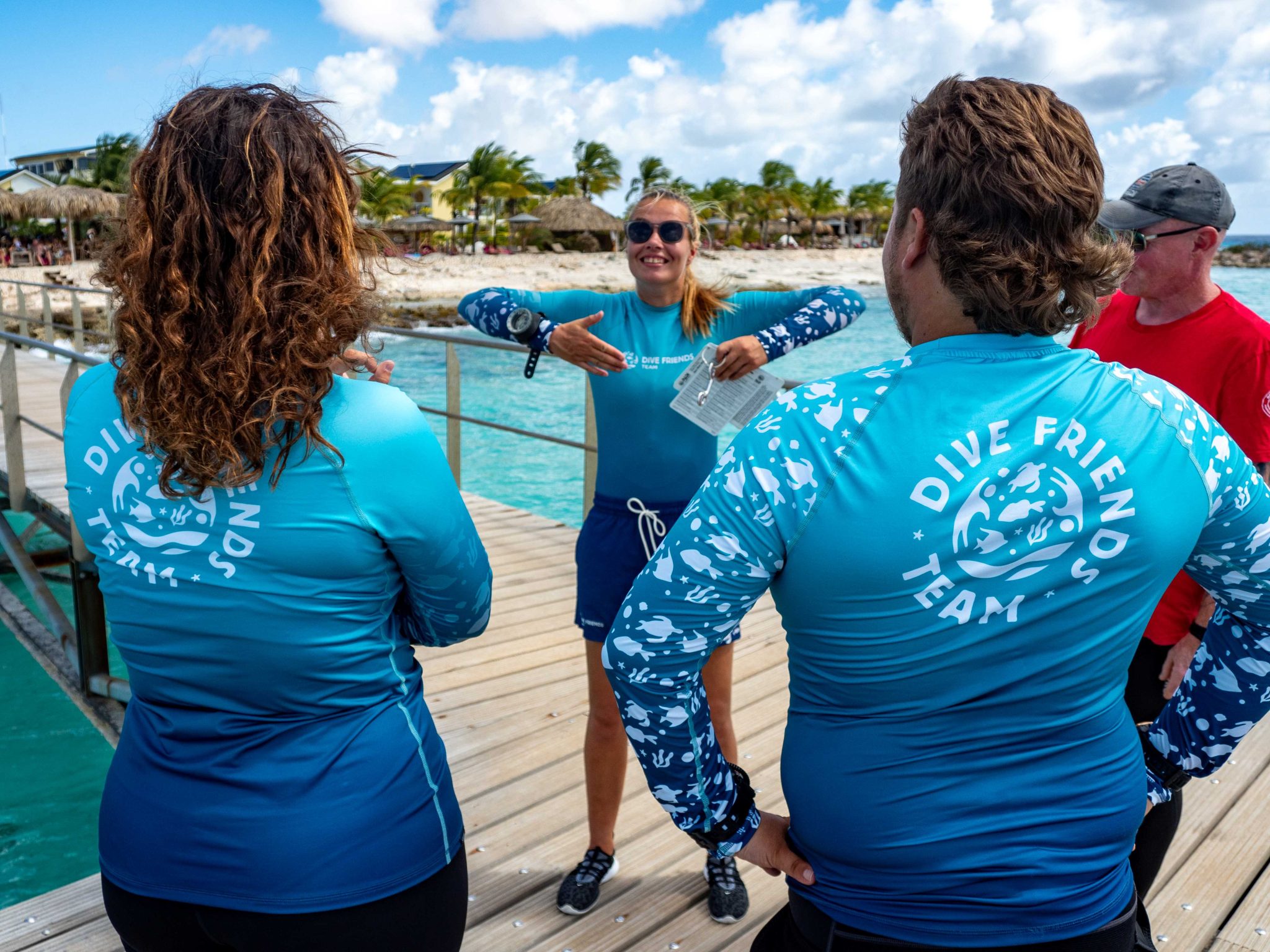
Dive Friends teaches the Instructor Development Course (IDC) several times a year to students who are eager to share their passion for diving with the world.
Dive Friends is known for the personal approach throughout the course. Their in-house course director will lead the students through every essential step, mentoring them to achieve their fullest potential as a dive instructor.
Applications for the following IDC start dates are now open:
- 12 April
- 5 July,
- 20 September
- 29 November
Partnership with Casita Palma
If the student opts for the IDC-Deluxe or IDC-Supreme package, their accommodation will be arranged for them at Casita Palma. This small and quiet resort is within walking distance from Dive Friends Bonaire’s main dive shop location and has everything you need to relax after an intense day of IDC training. Breakfast is included, so the student will always be fuelled and ready for their day.
Contact Dive Friends Bonaire’s Course Director Eddy for more information: coursedirector@divefriendsbonaire.com.
-

 News3 months ago
News3 months agoHone your underwater photography skills with Alphamarine Photography at Red Sea Diving Safari in March
-

 News2 months ago
News2 months agoCapturing Critters in Lembeh Underwater Photography Workshop 2024: Event Roundup
-

 Marine Life & Conservation Blogs2 months ago
Marine Life & Conservation Blogs2 months agoCreature Feature: Swell Sharks
-

 Blogs2 months ago
Blogs2 months agoMurex Resorts: Passport to Paradise!
-

 Blogs2 months ago
Blogs2 months agoDiver Discovering Whale Skeletons Beneath Ice Judged World’s Best Underwater Photograph
-

 Gear News3 months ago
Gear News3 months agoBare X-Mission Drysuit: Ideal for Both Technical and Recreational Divers
-

 Gear Reviews2 months ago
Gear Reviews2 months agoGear Review: Oceanic+ Dive Housing for iPhone
-

 Marine Life & Conservation2 months ago
Marine Life & Conservation2 months agoSave the Manatee Club launches brand new webcams at Silver Springs State Park, Florida











